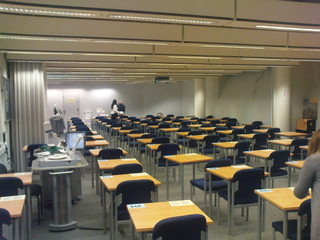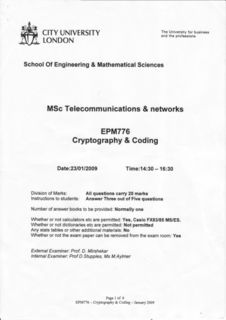Session Delivery in English
 It so happened that I had the opportunity to study at the magistracy at the University of City University London. For the half a year that has already passed, I saw a lot of new things, including how the local education system works, and I managed to evaluate it.
It so happened that I had the opportunity to study at the magistracy at the University of City University London. For the half a year that has already passed, I saw a lot of new things, including how the local education system works, and I managed to evaluate it.In my opinion, the approach to the process of teaching students abroad is quite different from the Russian one - there are quite a lot of features. In particular, the process is structured so that the human factor in grading is always minimal, and the knowledge given to the student is measured as objectively as possible.
Since now many readers of Habr have a session, I decided that a post on this topic could be by the way and I would like to talk about how exams are held in one of the universities of London, and how they are given marks for the passed subjects.
I want to start with a small lyrical digression and a general impression: I like how everything is organized here. When I was studying in Russia (at PSU and SPbGPU , at school), I was often bothered by the fact that the grade given by the teacher on the ordinary oral exam sometimes depends very much on many factors that have nothing to do with the student’s knowledge of the subject. Someone from the teachers overestimates the beautiful girls, someone recalls the missed lectures and "revenge"; Some of the students get a “free ticket”, someone manages to write off, and someone, having learned almost everything, collapses on a randomly tricky question. And, of course, we must not forget that a certain number of students have “connections” (for example, Dad knows the dean or his uncle works in the university administration). The result of this mess is that the graduate's graduation marks in the diploma to the future employer are little talked about, because he knows that points are not always an objective measure of knowledge. For example, half of my former odnogruppnits were programming fives, although now write a program that displays "Hello world"
')
In London (and, probably, in the whole civilized world as a whole) the subjective factor in grading is removed at the system level, therefore the points for the subject reflect knowledge with a much smaller random component, in other words - dispersion.
So, first things first.
Knowledge assessment system
For an item (module) you can get not 3, 4 or 5, but from 0 to 100 points, like in our USE. A student is certified if he scores from 50 points, otherwise the subject is not counted for him, and you need to pass it again next year. It’s impossible to get 100 in practice - only super-genial people can earn so much. There are no “fives with a minus”, “triples with two pluses”, “solid fours, closer to five” that look like 3, 4 and 5 in the diploma. Two students who know the subject can be compared in different ways points for the subject, and this comparison will be very objective. The final score is calculated not only on the results of the exam, but also includes marks for coursework and labs. For example, in cryptography (the exam for which I passed on Tuesday), 25 out of 100 points make up grades for labs (maximum 10) and coursework (maximum 15). The remaining 75 are added on the results of the exam.
Exam
Exam written. There are no tickets to pull out, hoping for luck. All students have one version of the assignment, so you do not have to rely on luck, or fear "nefart."
I remember that in the first year, when I passed the history of Russia, I learned only two questions from
 Let's go back to London. So, the exam, as I said, is written. It is held in a large enough audience, where the desks are arranged so that students do not sit side by side, but always through the aisle. In parallel, different streams of students can take different exams in the same classroom, starting and ending at the same time. Each student has his own predetermined place (the number of the table to sit on is written in the list on the wall inside the audience). Thus, running around and crushing immediately after opening the audience is excluded in order to take a place of more do-it-yourself. Already during the exam, a man with a list passes by each student, checks the student student, looks at it, whether you are at all or not, in your place, and makes a note of itself. You cannot have anything other than pens and a calculator, of course. At the entrance to the audience a special person will check the hands of the students to the elbow (so that there are no wearable cribs). In principle, there is no sense to prepare spurs - it will not be written off anyway. A mobile phone and other “prechandals” that you don’t want to leave in a pile of things in the corner should be turned off and placed on the floor under your desk so that you can see it. It is not recommended to keep anything in your pockets so that there are no random misunderstandings. It is impossible to turn, whisper, remarque, etc. All these points are discussed, and for violations the highest measure - pasture. As a result, no student is interested in bad behavior and cheating, you have to rely only on your own head, which, from the point of view of the system, is correct.
Let's go back to London. So, the exam, as I said, is written. It is held in a large enough audience, where the desks are arranged so that students do not sit side by side, but always through the aisle. In parallel, different streams of students can take different exams in the same classroom, starting and ending at the same time. Each student has his own predetermined place (the number of the table to sit on is written in the list on the wall inside the audience). Thus, running around and crushing immediately after opening the audience is excluded in order to take a place of more do-it-yourself. Already during the exam, a man with a list passes by each student, checks the student student, looks at it, whether you are at all or not, in your place, and makes a note of itself. You cannot have anything other than pens and a calculator, of course. At the entrance to the audience a special person will check the hands of the students to the elbow (so that there are no wearable cribs). In principle, there is no sense to prepare spurs - it will not be written off anyway. A mobile phone and other “prechandals” that you don’t want to leave in a pile of things in the corner should be turned off and placed on the floor under your desk so that you can see it. It is not recommended to keep anything in your pockets so that there are no random misunderstandings. It is impossible to turn, whisper, remarque, etc. All these points are discussed, and for violations the highest measure - pasture. As a result, no student is interested in bad behavior and cheating, you have to rely only on your own head, which, from the point of view of the system, is correct.Separately, I want to say about the tasks themselves and about where the answers should be written: everything here, too, in my opinion, is logical and rational. First I will tell about the task itself. The ticket is printed on several sheets of A4 fastened together and consists of five questions. For the answer to each question you can get a maximum of 20 points. The pleasant thing is that it is completely unnecessary to answer all the questions - in order to score the maximum, you need to perfectly answer three of the five. In my case with cryptography, the total number of points will then be multiplied
Now, about the forms for answers. It should be written in notebooks (albums), which are designed specifically for exams. You cannot bring any papers with you "for draft papers and notes" for obvious reasons - you can bury cribs in them. Notebook sheets are about A4 in size, the covers look something like this (the link is the cover of a notebook for answers from another English university; it is very similar to the one we had, only ours are a little
At the exam itself, the teacher is not present , and, therefore, will not be able to help the "favorites". There are about
The exam usually lasts two hours. There is so much time to barely have enough to write answers to the three necessary questions - this is done so that only those who have learned perfectly can have time to answer, and those who “swim in the subject” do not have time and, therefore, receive a lower rating. In addition, at the beginning of the exam, 10 minutes are given to look at the task sheet. At this time, you can not write, make notes, you can only read and mentally choose your own questions.
At the appointed time, the main “supervisor” announces the beginning of the exam: “Your exam starts ...
After the end of exactly two hours, it is reported that time is up, and from that moment it is forbidden to decide or write something. The "supervisors" collect albums with answers, in front of everyone they put them in a special box. The albums that are not used as a purer album are also taken away so that no one can replace the album on the next exam. Everybody's Free.
Some moments
- Our university allowed only 4 models of calculators: Casio FX83 / 85 MS / ES. This was previously announced to avoid misunderstandings. The university’s website says that one of the reasons for such “cruelty” is not to give students the opportunity to use “too cool” calculators, which can, for example, be programmed to solve specific problems. Another way to solve this problem is the use of some devices similar to calculators, which the devil knows what might be stuffed with. In addition, all the calculators brought in are turned on by the “supervisor” and checked (and then suddenly someone inside the calculator guessed to push the cribs in the shape of a roll and sits scrolling them while looking at the screen). In any case, I don’t think that Casio pays the right to monopoly to the university in any way.
- Despite the fact that, remembering a couple of American youth films, I thought that it would be impossible to go to the toilet, the students were allowed to leave the audience. Naturally, it is impossible to take assignments and notebooks with answers. It is released only an hour after the start and is forbidden to exit 15 minutes before the end. The second limitation was probably made so that everyone was present at the field at the time of the end of the exam, and did not have to wait for anyone. Maybe they even leave to the stall to see off, in order to exclude communication with the “smart friend” outside the door, I did not try to go out. In any case, it is not profitable, because time is running out.
 Some exams are allowed to take home assignment forms. It is written on the title page next to other information about whether it is possible or not (how many questions need to be answered, whether it is possible to use calculators, dictionaries, reference books). On the right - the scanned title of the job for the last year, which was given to me by a friend (by clicking - the scanned document
Some exams are allowed to take home assignment forms. It is written on the title page next to other information about whether it is possible or not (how many questions need to be answered, whether it is possible to use calculators, dictionaries, reference books). On the right - the scanned title of the job for the last year, which was given to me by a friend (by clicking - the scanned document in Google docs ). In any case, the questions that were on your exam last year are posted online on the university website, so you can partially prepare for them.- All rules for all exams are the same at the university level and posted on the website . The set of rules is carefully worked out and even regulates the behavior in case of possible evacuation during the exam.
- Despite the fact that everything is very strict and serious, "supervisors" are extremely kind, responsive and full of desire to help. For example, they helped me a lot to properly decorate the title-book, they fixed a mobile phone and a flash drive on the floor so that no one could step on them, several times they offered to take the second album for answers, they smiled. In general, it left a good impression. Now we have to wait for evaluation.
Conclusion
Many are opponents of written exams, and argue that only in the process of live communication with a teacher can you be adequately evaluated. I disagree with this on a number of reasons, some of which I indicated at the beginning of the article. In my opinion, properly created questions for the written exam have a much greater ability to assess student knowledge than oral “roulette”. As a result, the grade obtained in the exam is as objective as possible, and the certification process does not take longer than the one that takes our classic version with the oral exam. The anonymity of the work at the verification stage ensures that the teacher does not have a bias towards the student. Logic and common sense reigns in everything. Honestly, it is even difficult to think of what can be changed for the better in such a system.
I hope that here in Russia, someday exams will also be evaluated with greater objectivity than now, and the grades will carry more information about the student. In order to introduce this everywhere in our country, a lot of things need to be changed both in the education system and in the heads of people. In any case, you can not just copy, because it turns out, as always.
In conclusion, I would like to wish all students a successful exam, more “freebies” - because it is so highly probable in most universities in Russia!
Thank you all for your attention. If it is interesting, I can somehow write about the features of the university where I am currently studying, in particular, about the university site, which struck me with its capabilities at first.
Source: https://habr.com/ru/post/80732/
All Articles